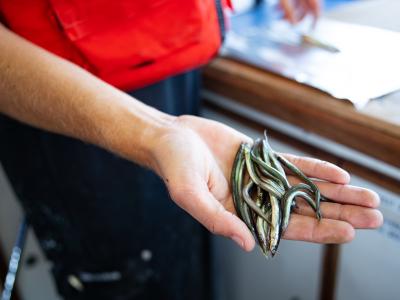What are current environmental study needs?
Each year, BOEM’s Environmental Studies Program (ESP) proposes and funds new studies through its annual Study Development Process. During that process, BOEM welcomes new study ideas from stakeholders, provided those are consistent with priority research themes and strategic science questions outlined in our Strategic Framework. BOEM also develops study ideas internally based on priority needs. The Marine Minerals Program then reviews the external and internal study ideas to develop study profiles that enter the Study Development Process.
BOEM is interested in the following priority themes:
Improving Understanding of Physical and Biological Impacts to Sediment Borrow Areas
Ideas addressing data gaps related to OCS borrow areas and benthic resources, communities and habitats (e.g., benthic community diversity; trophic transfer; habitat resilience and response to repeat bottom disturbance; and physical change, recovery, and resiliency in borrow areas).
Research topics of interest include acquisition and analysis of longitudinal physical and biological baseline data in potential dredging areas of particular environmental concern; assessment of sea turtle and other protected species distribution and behavior; and before-after-control-impact studies evaluating physical and biological change in OCS borrow areas.
Application of Innovative Technologies and Techniques in OCS Studies
Ideas on applying and advancing innovative technologies and techniques (e.g., unmanned or autonomous vehicles, tagging, satellite imagery, electromagnetic surveying, eDNA, etc.) for reducing costs, improving measurement of impacts, and for avoiding impacts during exploration or dredging.
Research topics of interest include use of emerging technology to improve protected species observation and avoidance during dredging operations; fisheries impact avoidance or minimization; eDNA and metabarcoding tracing to understand changes in biodiversity and benthic species distribution across seasons and dredging events; and quantitative assessments of dredge impact or the effectiveness of mitigation measures.
Understanding Long-term Consequences of Coastal Restoration in a Changing Climate
Research related to evaluating efficiency and effectiveness of the use of OCS materials in coastal restoration efforts, including determining long-term estimates of OCS sediment needs such that BOEM can allocate resources responsibly to meet these demands.
Research topics of interest include economic cost and benefit evaluations related to the use of OCS resources; predictions of resilience and fate of OCS materials in coastal systems; and quantitative assessments of long-term (20-100 years) OCS sediment use.
Critical Minerals
Research topics of interest include studies that contribute to improved environmental and archaeological understanding in identified critical mineral permissive areas; baseline data acquisition from potential mining sites; and environmental assessment of mining operations, such as on-ship processing, turbidity plumes, and sedimentation.
Learn more about ongoing studies.
Learn about the National Studies List for this fiscal year.


